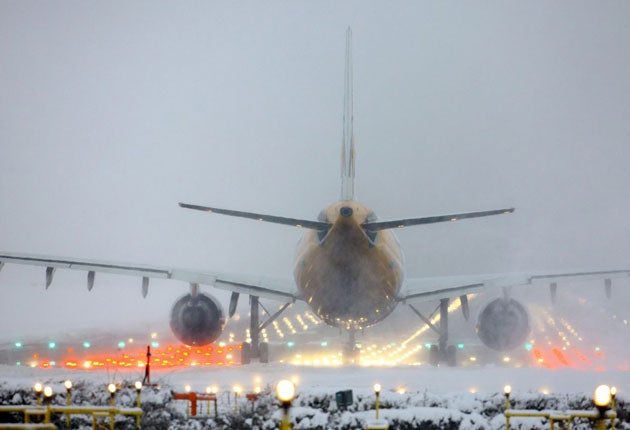Your support helps us to tell the story
From reproductive rights to climate change to Big Tech, The Independent is on the ground when the story is developing. Whether it's investigating the financials of Elon Musk's pro-Trump PAC or producing our latest documentary, 'The A Word', which shines a light on the American women fighting for reproductive rights, we know how important it is to parse out the facts from the messaging.
At such a critical moment in US history, we need reporters on the ground. Your donation allows us to keep sending journalists to speak to both sides of the story.
The Independent is trusted by Americans across the entire political spectrum. And unlike many other quality news outlets, we choose not to lock Americans out of our reporting and analysis with paywalls. We believe quality journalism should be available to everyone, paid for by those who can afford it.
Your support makes all the difference.Forecasters warned there is no end in sight for icy conditions as the death toll rose and transport networks struggled to cope with the freezing weather.
Two pensioners died after falling in their gardens in sub-zero temperatures while a motorist who stopped to help a stranded driver died after he was struck by another vehicle.
As a working week beset by major disruption comes to an end, commuters face continuing chaos on the trains and drivers were warned of the danger of black ice on roads.
Transport Secretary Philip Hammond summoned Government chiefs for an hour-long emergency weather meeting today to "stocktake" and discuss preparations for the weekend, a Downing Street spokeswoman said.
Though the worst of the snow has fallen, temperatures remain low and rain is set to make Britain's frozen roads and pavements even more dangerous.
"The problem is the ground temperature is lower than the air temperature so makes thawing difficult," said Aisling Creevey, a forecaster with Meteogroup, the Press Association's weather division.
"It's going to be really cold into the next 10 days."
There might be a slight reprieve tomorrow for the south of England with a rise in temperatures to about 5C expected.
But that will not be enough to melt the ice which is expected to be worsened by rain - predicted for tonight and tomorrow morning - freezing on top.
Any thaw will "be a very slow process", said Miss Creevey.
"It's a big, icy mess - I would be really advising caution, it is going to take time to thaw out."
The warning came as details emerged of the first casualties.
Police said they feared 80-year-old Lillian Jenkinson had frozen to death after collapsing in her back garden in Workington, Cumbria.
Her body was found at 10.40am yesterday, the day after an elderly man was found dead in his garden in Kirby Stephen, also in Cumbria.
The deaths prompted charities to urge residents to check on elderly neighbours.
Meanwhile North Yorkshire Police said a 57-year-old man, who has not been named, was standing behind his Land Rover Defender when he was struck by a Land Rover Freelander.
He had stopped to help recover a Vauxhall Corsa from a ditch at Bellerby Bank, between Richmond and Leyburn, on the edge of the Yorkshire Dales, when the accident happened at 7pm yesterday.
Downing Street today declined to offer a guarantee that the country would not run out of salt and grit but said the nation was "in a much better position than we were last year".
The spokeswoman added there were "no major concerns" over supplies of food, petrol, diesel or gas.
Gas supplies were higher than last winter and so far there have been "no supply issues related to the cold weather", she said.
Despite Downing Street's assurances, the Retail Motor Industry Independent Petrol Retailers' Association said some forecourts were out of fuel and others could soon run out diesel or even petrol.
Politicians are keen to avoid a repeat of last year's panic over road salt supplies when emergency deliveries were made to councils up and down the country.
This time last year the Highways Agency had 227,000 tonnes of salt. It now has 260,000 tonnes and local authorities in England have 1.2 million tonnes.
This week has seen airports close, trains grind to a halt and millions of travellers' plans thrown into chaos because of continued snowfall and plummeting temperatures.
Mr Hammond, under fire from Labour and told to "get a grip" of the situation, announced a review of how transport operators have coped with the big chill.
Road rescue groups the AA and the RAC were dealing with 2,000 and 2,500 breakdowns an hour respectively, they said.
Rail operators were faring little better, with delays across the country. At 1pm more than a quarter (28%) of rail services were not running and of those able to operate only just over half (53%) were running on time.
The Association of Train Operating Companies (Atoc) said services in south east England and Scotland were the hardest hit.
Atoc chief executive Michael Roberts said: "We recognise that lessons can be learnt and, in particular, that the whole industry needs to get better at handling disruption."
Cross-channel services were also badly affected, with Eurostar cancelling 17 trips today because of the poor weather conditions in the UK and Northern France.
The high speed passenger train, which operates between the UK and Europe, advised it would run on a significantly reduced timetable until at least Sunday.
Hundreds of schools across Britain remained closed.
The weekend's sporting fixtures have also taken a battering by the weather, with a number of football matches postponed and race meetings abandoned.

Join our commenting forum
Join thought-provoking conversations, follow other Independent readers and see their replies
Comments